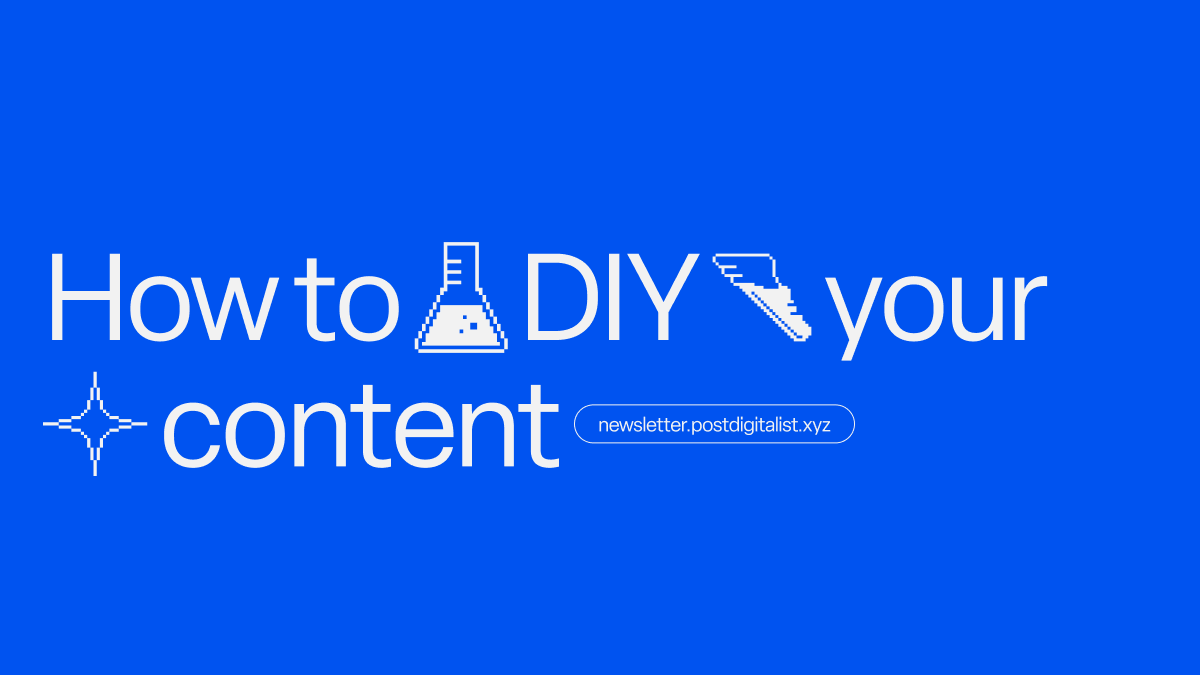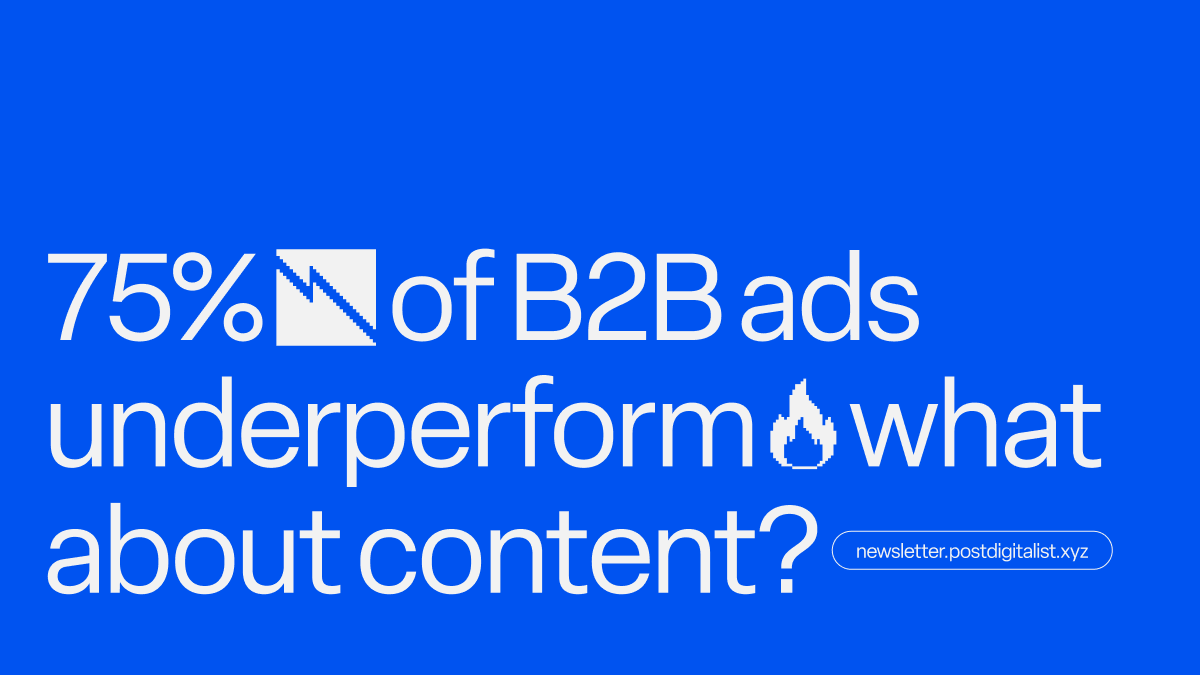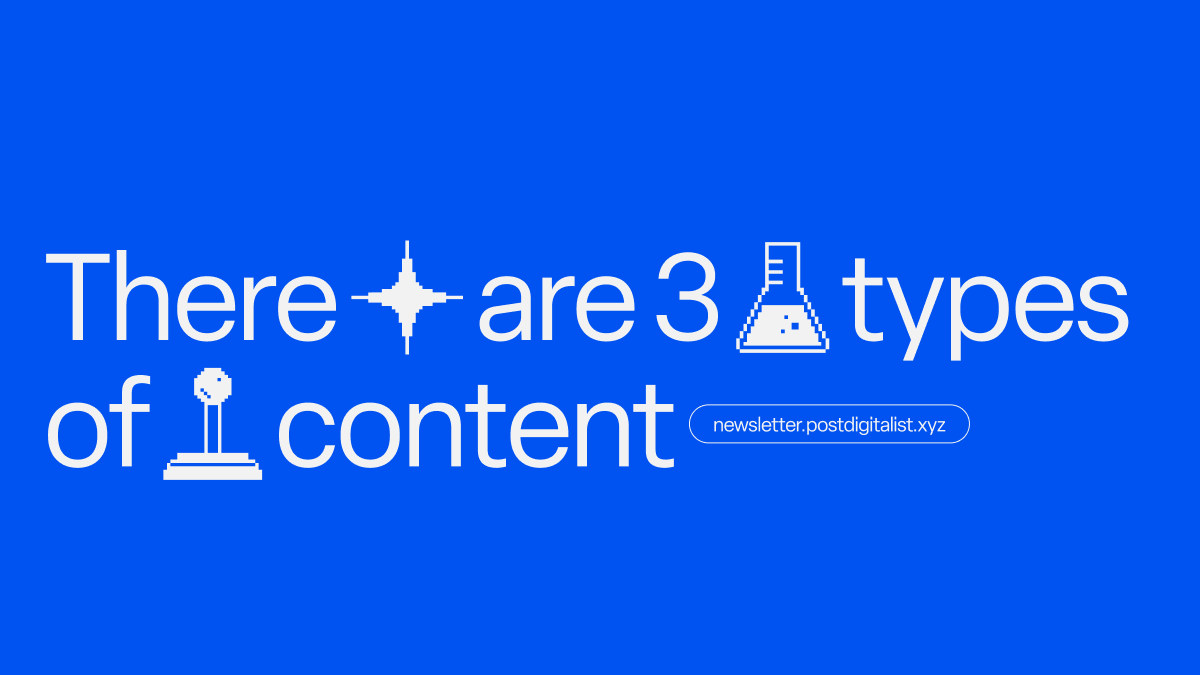Should you hire a content agency or DIY?

Hi, Aaron from Postdigitalist here 👋
There's a question that I often get asked by other service business founders. It usually goes something like this: "I'm not sure if I want to hire an agency - does it make sense to DIY my own content? Or, can I train someone in my team to write?"
This question has many different layers, and all of them are worth peeling. I'm writing this post so I have a good asset to forward to these colleagues. And who knows, maybe it's useful to you too.
Let's dive in.
Why companies hire digital marketing agencies
First, there's something worth clarifying: Why do companies hire content agencies to begin with? Is that rationale correct? Does it make sense to hire a content agency in 2024/2025?

Companies hire content agencies (or any type of agency) because:
- They need to cover a need that requires skills, tools & people that they don't have in-house.
- It doesn't make sense to develop those capabilities internally, due to cost, speed, or strategic priorities.
- Since the need they have to cover is the vendor's bread and butter, they trust that they'll be able to meet their expectations effortlessly.
At first sight, it may seem like hiring an agency is a no-brainer. It's usually far less expensive, stressful, and risky than building an in-house team. But not all agencies are created equal.
Enter generalist digital marketing agencies
Most often, founders ask me that long-winded question about staying away from content agencies because they've tried to work with an agency before, but things went terribly wrong. And these negative experiences are often the consequence of a very simple fact: They tried to work with a generalist agency.
What's a generalist agency?
A generalist marketing agency offers a wide range of services, such as paid media, social media, SEO, content creation, and branding. They serve various industries, providing flexible, all-in-one marketing solutions for businesses needing multiple services from a single partner.
"Generalists" do anything for anybody. This promise may seem attractive to some people, who are tired of juggling vendors. To make things worse, in some cases, these vendors are "hidden generalists", who are silently competing to take each other's territory, with the client caught in the crossfire.
With those experiences under your belt, a one-fits-all partner may look like a good solution. And some agencies can do everything - or at least, they can partner with other agencies to provide end-to-end marketing services. But pulling off these complex, cross-domain marketing operations is demanding and expensive.

Most generalist agencies don't live up to their promises. Especially, those on the lower end of the price spectrum.
Most entry-level generalists are relatively effective in B2C environments. But they aren't used to the frameworks, demands, and sales cycles of B2B products/services.
Most colleagues of mine who've hired a generalist agency for content marketing complain about 3 things:
- Lack of results
- Technical inaccuracy
- Irrelevant content
Lack of results is a clear consequence of poor strategy.
Technically inaccurate content is the result of:
- Hiring content creators who know nothing about the product/service or the domain it operates in.
- Not having the processes to train them.
Irrelevant content is a result of these two other factors. In short, the agency doesn't know what they're doing and they don't have the domain-specific knowledge to distinguish what works from what doesn't.
Agencies may offer a wide array of services, but niche-specific expertise is a must. Especially when it comes to B2B content marketing.
An alternative to generalist agencies
At this point, it may seem pretty obvious, but the best alternative to hiring a generalist agency is to hire a content studio with expertise in your niche. If you're in enterprise B2B SaaS, Fintech, or Web3, that agency is Postdigitalist.
Aside from having deep expertise in your niche, a specialized agency will know how to collaborate with your internal team to come up with fresh and effective content ideas, fixing those 3 pain points I mentioned some paragraphs ago.
"I still want to DIY my content - how can I do it?"
Let's say that you don't want to work with an agency. Not even a specialized agency.
There are four ways to go about it. You could:
- Assemble an internal content team
- Hire external SEO help and produce the content with in-house resources
- Write a founder's column
- Automate your content marketing
I ranked these options from the best to the worst. Let's take a closer look at each one.
Assemble an internal content team
Want to build an in-house content marketing team? Fair enough. Hiring has its cons - but it surely has its pros too.
A minimum viable content marketing team would include:
- An SEO specialist
- An editor/content marketer with expertise beyond SEO
- 1-4 content editors with the ability to both write and QA content
- A graphic designer who supports the content team specifically
Some may argue that an SEO specialist doesn't need help leading content marketing efforts. Why have a non-SEO making strategic decisions?
Having a content strategist and an SEO working together brings a sense of balance, where decisions are being made with both SEO and brand/commercial goals in mind.
Hiring a content team takes time and money, making sure they work well together is a whole different challenge. One of the main advantages of hiring an agency is that you're dealing with a battle-tested team, with a shorter time-to-value than internal hires.
Hire an SEO consultant & produce in-house
Another option is to assemble a content production team with your in-house technical specialists and hire an SEO consultant to provide some structure to the content strategy. This is purely hypothetical, I've never seen this in action first-hand. But I know of companies where content is produced by non-content people (developer advocates, for instance), and QA'd by SEOs.
This could be a good way to produce technically accurate, strategically sound content. But it relies on already having a team of proficient communicators.
Write a founder's column
Another way to get your content program started could be to write a founder's column. This could be a good way to build thought leadership and humanize the brand. But it'll probably yield slower results.
You already have a job: You're a founder. And you probably have tons on your plate already. Are you sure you want to carry your company's entire content marketing program too?
A founder's column can be a great way to sprinkle some added value on top of your regular contentOps. But this type of insight-driven content is:
- Time-consuming and slow to produce
- Unscalable
- Hard to optimize (without jeopardizing quality)
In the age of at-scale, product-centric content, a founder's column may be effective for conversions and loyalty-building, but it's unlikely to bring enough visibility to validate SEO as a lead acquisition channel.

I, Robot
Hiring an internal content team can be a demanding side quest. Combining external SEO help with in-house experts requires some fortunate pre-conditions, but could work wonders. With the right distribution, a founder's column could strengthen customer loyalty and reignite old conversations, even if it doesn't fill your funnel with qualified organic leads.
This last option is probably the worst one. Please, don't do this.
In short, this option consists of replacing experts and writers with AI tools. There is no such thing as "fully automated high-quality content". It just doesn't exist.
Even when doing programmatic SEO, we always QA everything, from landing page designs, to microcopy.
There's a place for AI in content marketing. Actually, there are several. At Postdigitalist, we use AI to:
- Simplify content distribution
- Produce metatags & microcopy
- Organize keywords by intent
- And more
You can learn more about it on our "AI SEO strategy" guide:

But you can't leave your entire content strategy to the machines. The results are usually ineffective and brand-damaging, ranking from very low-value content to keyword-heavy nonsense. AI can speed things up, but the creativity and problem-solving needed to pull off a successful content marketing program can't be fully automated yet.
Kickstart Your Content Program in 10 Blog Posts
Don't have the budget to hire an agency, nor to hire a full team of in-house writers?
Some months ago, we wrote an article explaining which 10 posts you should write if you can't invest in content consistently.
Check it out:

That's a good starting point if you want to validate SEO as a channel, before pouring resources into it.
Happy writing!
Aaron





